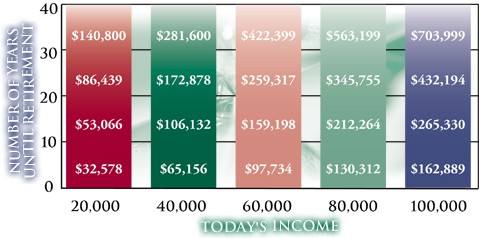Retirement Planning: Look at Retirement Expenses and Your Nest Egg
![]()
More than ever the quality of your life in retirement will depend on the actions you take today. It wasn't very long ago that people could expect their non-working years to be funded by a nest egg made up of a combination of generous company pensions, Social Security benefits, unprecedented appreciation in the prices of their homes and some personal savings.
Much of this has changed. Today, most of the burden of planning and financing retirement is falling to individuals-not the government and not your employer. Social Security payouts are comprising smaller percentages of retirement income. Fewer companies are offering corporate pension plans. Many investment professionals predict that in the next ten to twenty years, the value of your home may not appreciate as much as in the past. What this all adds up to is that your personal investments will most likely have to account for the majority of your retirement income.
Theoretically, people should begin putting something aside for retirement the first day they enter the work force. The reality is that few people in their 20s can look that far to the future; their financial horizon may be as immediate as paying off student loans or saving enough to move out of their parents house. But if they paid attention to demographic trends, which indicate that most of us will spend 25% to 30% of our lives in retirement, they would know that they have to begin saving for the future today.
For example, if you save $1,000 a year for 30 years at 8% rate of return, your nest egg will reach $113,282. If the same amount is invested at the same rate for only ten years, the nest egg will be worth only $14,487 well below one quarter. (This is a hypothetical illustration only and is not indicative of any specific investment. Sales costs and taxes are not included in this example.)
How can you tell when you will be able to afford retirement? Your first step is to get a grip on what your expenses and your income will be. If you plan to remain in a big city and keep up a big-city lifestyle, you will, of course, need a greater income than someone who seeks a simple life in the country. Be aware though, that everyone spends more money on medical care as they grow older, and you will need to spend money on activities to fill all of that free time, whether your favorite pursuit lies in your backyard garden or on the fairway.
Financial planners recommend starting to plan by looking at current monthly income and expenses over a period of several months, then depending on your retirement lifestyle choices, compare these amounts with what you think you will need in the future. Many investment professionals believe that retirees need as much as 75% to 80% of their working years income for a comfortable retirement lifestyle.
In the left-hand column of this chart find the number of years until retirement, then find today's income along the bottom. Read up to see how much annual income is required at that future date to match today's buying power. (Based on a 5% inflation rate.)

